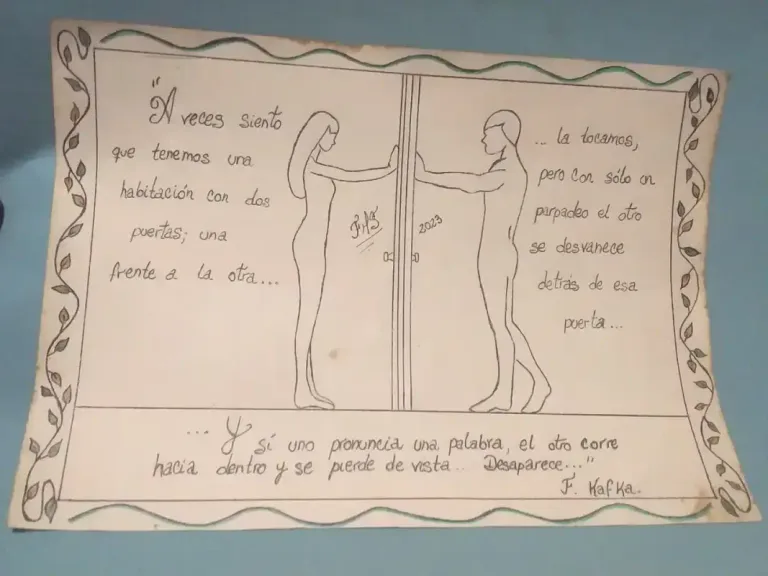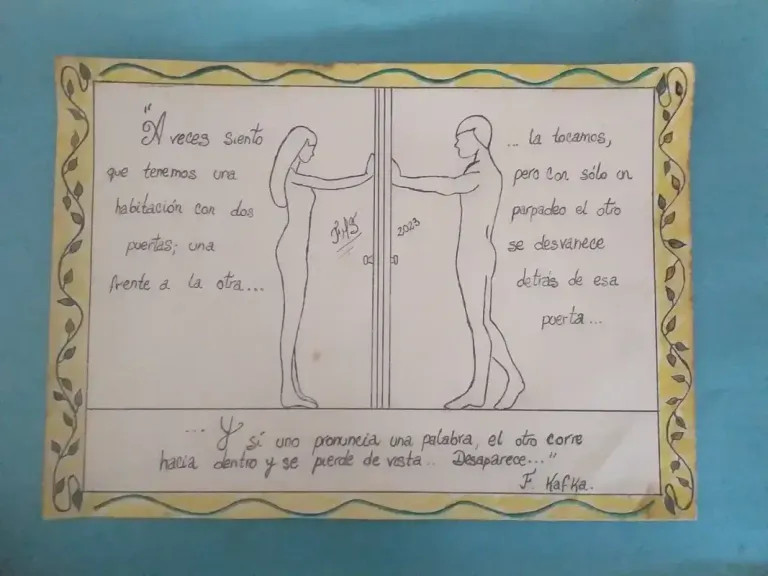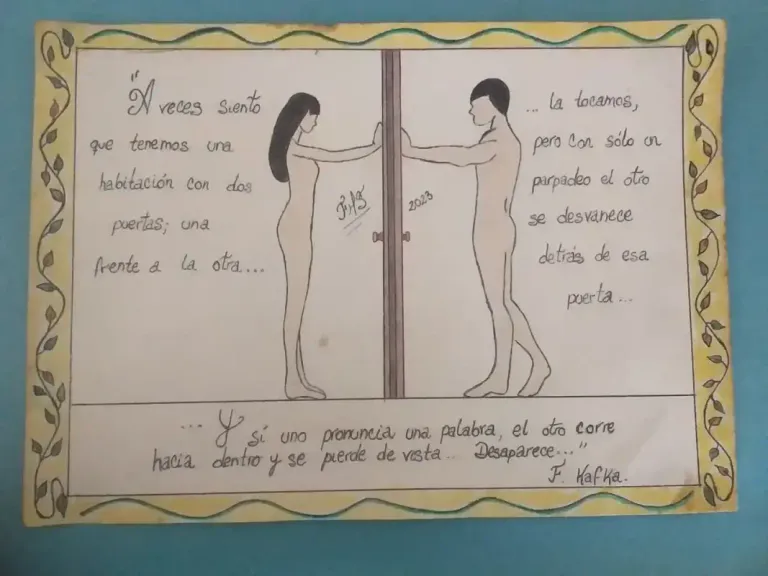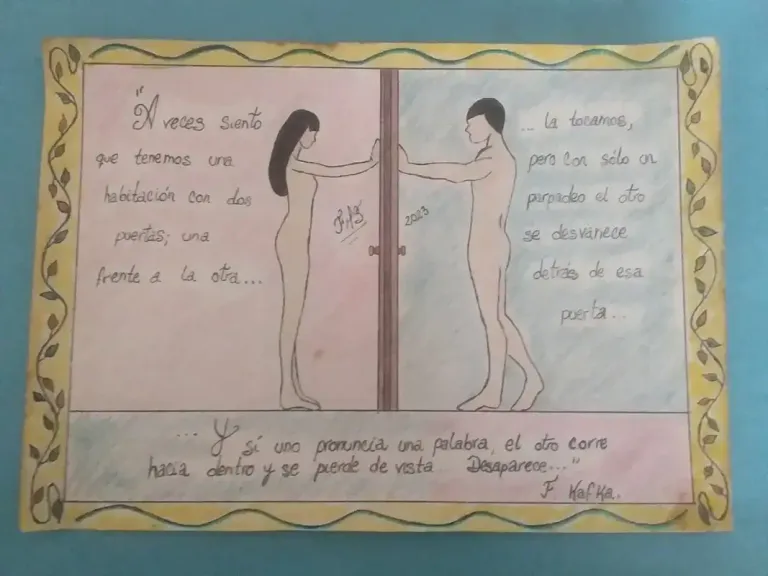
Dibujo realizado por el autor.
Título: Literatura epistolar: "Cartas a Milena" de Franz Kafka. Por Florencia Renata.
Franz Kafka, fue un escritor checo en lengua alemana (1883-1924), cuya literatura estaba marcada por una abierta manifestación de su angustia vital y sus conflictos internos. En sus obras, el ser humano se encuentra impotente ante todo aquello que enfrenta constantemente: un mundo incomprensible que se le impone cada vez. Sentía con gran intensidad todo cuanto ocurría en el mundo y las realidades opresivas le causaban un profundo desasosiego. Gran parte de sus obras maestras sobrevivieron gracias a su amigo Max Brod, quien logró publicarlos después de la muerte del escritor, pues en vida éste no quiso realizarlo, ya que el propio hecho de publicarlas le resultaba profundamente perturbador.

Dibujo realizado por el autor.
Aunque sí bien su obra más recordada es La Metamorfosis, existe una gran variedad de títulos de su autoría, entre ellos los epistolares. En el año 1920, se encontraba escribiendo la novela La colonia penitenciaria, un texto inquietante sobre las prisiones, y a la par, Kafka mantenía una intensa correspondencia con la periodista y traductora checa Milena Jesenská, con la que inició una relación amorosa que se prologaría hasta el 1921.

Dibujo realizado por el autor.
"Cartas a Milena" se convirtió, muchas décadas después, en una significativa obra epistolar que recopila algunas de las cartas que Franz envió a Milena en ese tiempo. Dichas cartas pudieron salvarse por un amigo de Milena, Willy Haas antes de que la Gestapo la arrestara en noviembre de 1939, por participar en un movimiento de resistencia clandestino y ayudar a muchos refugiados judíos y políticos a emigrar. Milena Jesenská fue una periodista liberal checa y traductora, que contaba con 23 años cuando conoció a un Franz Kafka de 36 años. Ella era inteligente, temperamental e impulsiva, él era el eterno indeciso. Él era un judío de Praga de habla alemana, y ella era checa que hablaba poco alemán. Ella se encontraba casada con Ernst Pollak, un filósofo vienés que la mantenía en un matrimonio en crisis e infeliz por sus incontables infidelidades. Mientras que Kafka, se encontraba en un proceso de separación de su segunda prometida -Julia Wohryzek- y lidiando con los quebrantos de la tuberculosis que le empeñaban la salud desde 1917.

Dibujo realizado por el autor.
Su apasionado interés por la literatura moderna llevó a Milena a pedirle autorización a Kafka para traducir alguno de sus escritos, permitiendo el motivo del inicio del intercambio de correspondencia en 1920. Ese tiempo para Franz era de profundo abatimiento, y la mayoría de las cartas a Milena están cargadas de desesperación, llegando a expresar su deseo de ver toda su obra olvidada y destruida. Del mismo modo, formuló su profundo deseo de pureza y su anhelante redención. Aunque en estas cartas, también se pueden leer la más graves acusaciones que el propio Franz haya realizado hacia sí mismo, sus orígenes y su educación. Estas cartas representan un material de fondo invaluable. En enero de 1921 Kafka le pidió a Milena que renunciaran a la correspondencia y dejaran de verse. En octubre de 1920 le dio sus diarios de 1910 a 1920. En noviembre de ese año Milena lo visitó en la casa de sus padres, al igual que en los meses de abril y mayo de 1922. Su último encuentro fue en junio de 1923. Milena Jesenská, falleció en el año 1944, durante una operación renal, mientras permanecía recluida en el campo de concentración de Ravensbrück en Alemania.

Dibujo realizado por el autor.
Kafka escribió en su carta del 31 de julio de 1920: “... Y ahora, Milena, tú también te apartarás de mí. No por mucho tiempo, lo sé; pero ten presente esto: el hombre no aguanta mucho si su corazón no late ¿y cómo ha de latir mi corazón mientras tú te mantienes apartada?....”
P.D: el texto que acompaña a la ilustración de este post, corresponde a un fragmento de las cartas de Franz compartidas a Milena.

Dibujo realizado por el autor.
Title: Epistolary Literature: "Letters to Milena" by Franz Kafka. By Florencia Renata.
Franz Kafka was a Czech writer in the German language (1883-1924), whose literature was marked by an open manifestation of his vital anguish and internal conflicts. In his works, the human being finds himself powerless before everything he constantly faces: an incomprehensible world that is imposed on him every time. He felt with great intensity everything that was happening in the world and the oppressive realities caused him a deep unease. A large part of his masterpieces survived thanks to his friend Max Brod, who managed to publish them after the writer's death, because during his lifetime he did not want to do it, since the very fact of publishing them was deeply disturbing to him.

Dibujo realizado por el autor.
Although his most remembered work is The Metamorphosis, there is a great variety of titles of his authorship, including the epistolaries. In 1920, he was writing the novel The Penitentiary Colony, a disturbing text about prisons, and at the same time, Kafka maintained an intense correspondence with the Czech journalist and translator Milena Jesenská, with whom he began a love affair that would last until 1921.

Dibujo realizado por el autor.
"Letters to Milena" became, many decades later, a significant epistolary work that compiles some of the letters that Franz sent to Milena at that time. These letters were saved by a friend of Milena, Willy Haas, before the Gestapo arrested her in November 1939, for participating in an underground resistance movement and helping many Jewish and political refugees to emigrate. Milena Jesenská was a Czech liberal journalist and translator, who was 23 years old when she met a 36-year-old Franz Kafka. She was intelligent, temperamental and impulsive, he was the eternal indecisive. He was a German-speaking Jew from Prague, and she was a Czech who spoke little German. She was married to Ernst Pollak, a Viennese philosopher who kept her in a marriage in crisis and unhappy because of his countless infidelities. While Kafka, he was in the process of separating from his second fiancée - Julia Wohryzek - and dealing with the ravages of tuberculosis that had been threatening his health since 1917.

Dibujo realizado por el autor.
Her passionate interest in modern literature led Milena to ask Kafka for permission to translate some of Moderna's writings, allowing the reason for the beginning of the correspondence exchange in 1920. That time for Franz was one of profound dejection, and most of the letters to Milena are filled with despair, even expressing his desire to see all his work forgotten and destroyed. In the same way, he formulated his deep desire for purity and his longing for redemption. Although in these letters, one can also read the most serious accusations that Franz himself has made towards himself, his origins and his education. These letters represent an invaluable background material. In January 1921 Kafka asked Milena to give up correspondence and stop seeing each other. In October 1920 he gave her his diaries from 1910 to 1920. In November of that year Milena visited him at his parents' house, as in the months of April and May 1922. Their last meeting was in June 1923. Milena Jesenská, died in 1944, during a kidney operation, while she was being held in the Ravensbrück concentration camp in Germany.

Dibujo realizado por el autor.
Kafka wrote in his letter of July 31, 1920: "... And now, Milena, you will also turn away from me. Not for a long time, I know; but keep this in mind: a man can't stand much if his heart doesn't beat. And how is my heart supposed to beat while you stay away?....”
P.S: the text that accompanies the illustration of this post, corresponds to a fragment of Franz's letters shared to Milena.
Nota: la presente entrada es de mi autoría y fue publicada anteriormente en mi blog de Hive.
https://hive.blog/@flormarsal/posts
Congratulations, your post has been curated by @r2cornell, a curating account for @R2cornell's Discord Community.